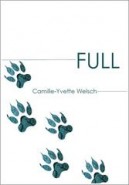
Book Review: Full by Camille-Yvette Welsch

Full
Poems by Camille-Yvette Welsch
dancing girl press, October 2016
$7.00; 18pp.
Reviewed by Nancy Posey
This slim chapbook—just twelve poems—is full, cataloguing a year in the life of the speaker and a wolf, to whom these poems are addressed. Opening with the “Full Wolf Moon” set in the dark hours of winter, she hears the wolf cries and imagines both her and the wolf in an odd fellowship as they experience “the hunger, / the days without sun, the night” with only a moon, as they wait out winter. Despite the similarity of their situation, waiting for spring and plenty, the speaker acknowledges in “Full Starting Moon” that she and the wolf “are friends only / in spirit” noting that she, like the wolf, would sacrifice the fellowship for food in time of hunger.
Through the course of these poems, the wolf’s presence, just out of sight but within earshot, permeates even her dreams. As time passes and the earth thaws, as “everything softens,” she offers the wolf renewed friendship. In “Full Worm Moon,” the speaker begins to clean the cellar, preparing to fill it again, just as the wolf gorges himself on “little animals, stupid and new,” fattening himself in preparation for the return of winter’s scarcity. In “Full Pink Moon,” the speaker shifts briefly to a first person plural. Lovers leave behind an indentation of “depression,” where she offers an apology to the wolf for abandoning the “claustrophobia” of the inside in the season of rebirth.
Beginning with “First Flower Moon,” the speaker feels the tension of eating to fullness and storing for the future, wanting “to keep the taste / of summer. . . long after / the days have shortened.” Even in her dreams, she is reminded that the season of plenty will end again. “Full Buck Moon” ushers in the larger community as all living things, not just the rutting bucks, are moved naturally to procreate. Her mention of her “burgeoning pup” and “plumping belly” alert readers that she will be responsible for the sustenance of other hungry bellies come winter.
As the poems pass through harvest season, as sturgeon are caught and salted, corn packed in the freezer, the speaker “grow[s] fattened and full . . . “watch[ing] the mound grow” and tracing the movement of a small foot inside her skin. In hunting season during the “Full Cold Moon,” from the safety of her home she warns the wolf of hunters, imagining him too safe somewhere. When the time of birth approaches, the speaker tends to lie still, curled around the new life she nurtures inside her, aware of other creatures who continue movement, unable to break their habits.
Welsch ends Full with “Full Cold Moon” set on the longest night of the year, presumably the winter solstice, ready to give birth and feed the caul to the wolf, ever aware of their interconnection. Readers, drawn through this course of a full year from winter to winter, from death to new life, see the cycle beginning again. The sharp concise imagery with the economy of words brings the reader into an odd fellowship of woman and creature, sharing their hunger and their satiety.
Nancy Posey lives in Brentwood, TN, where she is an adjunct English professor after retiring from full-time teaching in North Carolina. An avid reader, she participates in two book clubs and blogs about books at discriminatingreader.com. She also writes poetry, plays the mandolin, and always enjoys learning something new.

Leave a Reply